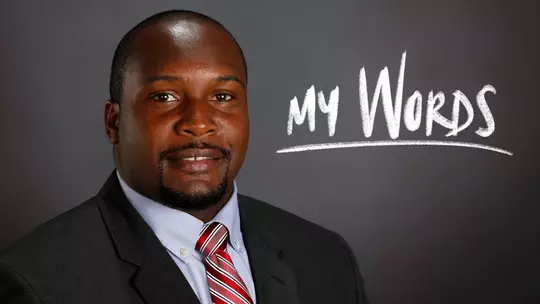
Connecting to our history
By Joe Suiter, Asst. Director of Career & Leadership
2/11/2021
Where does your mind go when someone asks you about the significance of Black History Month?
Does your mind go to a larger-than-life figure, like Dr. Martin Luther King, Jr. or Rosa Parks? Or to a single achievement, like a man of color being elected president of the United States not once, but twice? Maybe to the fundamental struggle for racial equality, which continues as fiercely now as it did decades ago?
My answer to that question sends me back to my college days in the mid-2000s and an invitation that turned out to have a significant impact on my life.
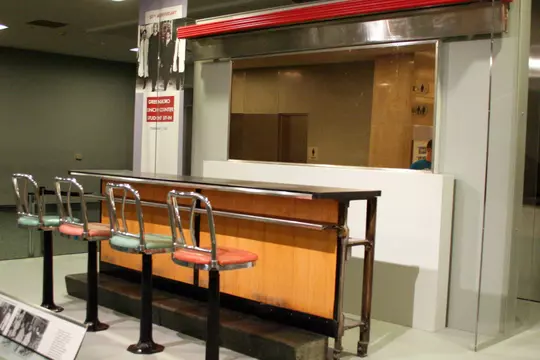
One of my professors at Appalachian State was preparing to escort a group of students from our campus in Boone, North Carolina, to Greensboro, North Carolina, to visit one of the early rallying points in the fight to end segregation in the U.S. She asked me if I wanted to go. Of course, I jumped at the chance.
We went to visit the International Civil Rights Center and Museum, which is housed in an old F.W. Woolworth department store. It’s the same building where four college students staged a sit-in at the “whites only” lunch counter on Feb. 1, 1960. The non-violent protest triggered a six-month exercise that involved an estimated 70,000 participants and ultimately prompted the retail chain to desegregate.
Raised in North Carolina, I’ve always been curious about seeing things like that. Having an opportunity to go and be alongside other people who respect and appreciate that kind of history, I was all for it. From that point on, any time I’ve had a chance to have a learning experience like that, I’ve been open to it.
Gallery: Civil Rights Museum Photos By Joe Suiter
I’ve since made trips to Memphis, Tennessee, to see the Lorraine Hotel where MLK was assassinated on April 4, 1968, and to Birmingham, Alabama, to see the 16th Street Baptist Church where four young black girls died when a bomb was detonated by Ku Klux Klan members on Sept. 15, 1963.
When I think of Black History Month, of course I can’t help but pay my respects to towering figures such as King, Parks, Barack Obama, Jackie Robinson, Malcolm X and John Lewis.
Just the same, I think about those four courageous men who refused to take no for an answer when they politely asked for service at that Woolworth counter: Ezell A. Blair, Franklin McCain, Joseph McNeil and David Richmond.
Just the same, I think about the four innocent girls who died in that church bombing: Addie Mae Collins, Carol Denise McNair, Carole Robertson and Cynthia Wesley.
Just the same, I think of the hundreds of Freedom Riders — white and black — who came south and risked their lives to fight against segregation on public transportation.
When I think of Black History Month, of course I can’t help but pay my respects to towering figures such as King, Parks, Barack Obama, Jackie Robinson, Malcolm X and John Lewis.Joe Suiter
Just the same, I think about those four courageous men who refused to take no for an answer when they politely asked for service at that Woolworth counter: Ezell A. Blair, Franklin McCain, Joseph McNeil and David Richmond.
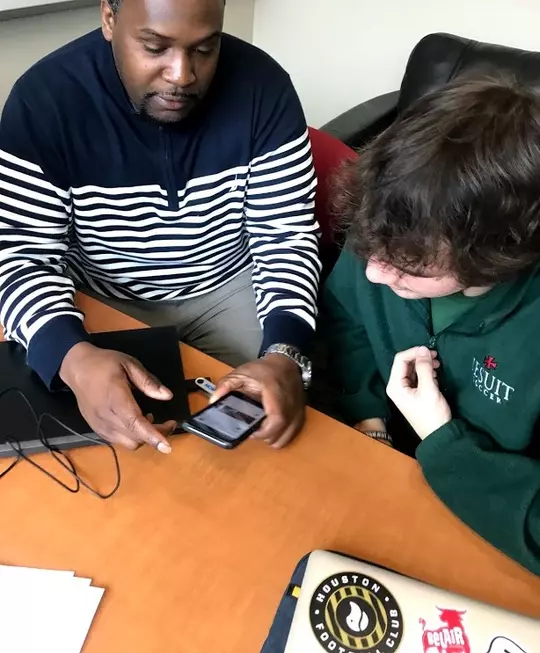
I’ve worked with student-athletes at my alma mater Appalachian State, Alabama and now at Wisconsin, where, since 2019, I’ve served as assistant director of career and leadership in the athletic department.
One of the points I’ve made to them is that the sacrifices made by all these people are the reason you’re able to come to a school like this and get an athletic scholarship. Those sacrifices are the reason we’re here today.
You have to know your past so you can ensure it doesn’t repeat itself. So many people made sacrifices for us. I’m thankful for everything they did.
I remember as a kid hearing the stories about the civil rights movement from my parents and watching movies about it, but until you see it all up-close and in-person, you really don’t understand the magnitude of it and how it impacted people from that point on.
Seeing that hotel balcony where King died; standing inside that church where innocent lives were snuffed out by hatred; seeing pieces of a Freedom Rider’s bus that was fire bombed; seeing the cell from where King wrote his famous “Letter from a Birmingham Jail” felt surreal.
You can’t help but think that could have been you. Young girls and young boys having a carefree moment in church, not thinking about the idea that other people have ulterior motives because they hate your skin color.
I was there thinking, “How would I have dealt with it? How would I have reacted?” I remember thinking, “Would I be strong enough to do what these people did? Would I have had that mentality that they had back then?” I hope I would, but you never know until you’re in that situation.
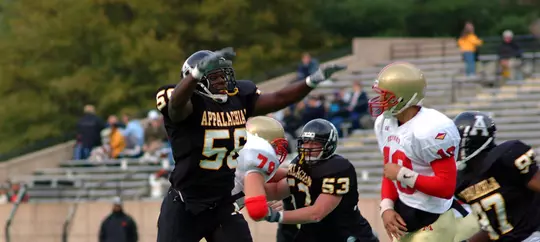
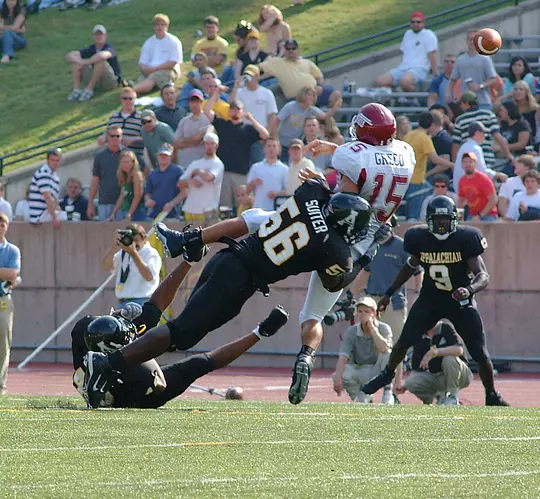
I can relate to student-athletes because I was one. I was a starting defensive tackle at Appalachian State and have a national championship ring from 2005 to prove it.
For a long time, I thought my career path would take me to the NFL — that was my goal — but when my senior year rolled around I realized that it might not be in the cards.
I left school with a degree in graphic arts and technology, but no plan and no idea what I was going to do with my life. Looking back, I wish I would have had someone in my ear, giving me advice about what to do.
Then I spoke to a former academic advisor who asked if I’d thought about getting a master’s degree in higher education. While pursuing that, the school offered me a job in the athletic department working with student-athletes.
Eventually the director of student-athlete development approached me and asked if I wanted to apply for his job. It turned out to be one of the most rewarding decisions I’ve ever made.
I learned right away that I loved it. At the end of the day, when a student-athlete approaches me about helping them with career placement and we go through the process of preparing them for a job search, nothing is more rewarding than seeing the excitement on their faces when they secure that job.
Student-athletes have more power than they think these days thanks to social media. So many of them are using their platform to shine a light on the difficult issues we face in our country. As long as they use that platform to make changes in a positive way, they have my support.
I thought the unity march of UW student-athletes and coaches last September was powerful. I spoke with one of the organizers who told me she was proud of the work she and the student-athletes had done. They did everything the right way. I heard their speeches. You have to be impressed with people 18, 19 and 20 years old who can feel the way they feel and voice their opinion in an eloquent way. Power to those student-athletes, black and white, for doing it, for being thoughtful with their intentions.
Same thing for the black-crested “W” that now appears on UW uniforms and apparel. It was a great idea. Something absolutely beautiful came from it.
Gallery: Wisconsin Student-Athlete Unity Rally
I’ve been tremendously impressed by how our student-athletes have handled the challenges of the last year brought on by the pandemic. It’s been a tough transition. Athletes are used to routine. It’s been hectic and stressful, but they’ve adapted.
Any kind of accolades or achievements that they get this year have to mean a little bit more than in a normal setting. You know how they put an asterisk in the record books suggesting that something has been tainted? This year an asterisk means the student-athletes did something extraordinary.
I took the job at Wisconsin after a long and crazy interview process in July of 2019. I spent two days stuck in Chicago due to weather issues, then took an Alco bus from O’Hare to Madison. I half expected to see cornfields and cows when I arrived, but saw beautiful city lights and lakes instead. The people quickly made me feel like I could be comfortable here.
Meeting with Brittany McGowan, the UW director of career and leadership, and her staff, you can see how genuine they are. My supervisor and my co-workers are some of the nicest I’ve ever worked with. They make sure that I’m feeling welcome, always checking in on me. Even the student-athletes, the ones that I met with during that time, were great. So far — I haven’t been here too long — but so far I feel everybody here has genuinely felt like family and they really want the best for you.
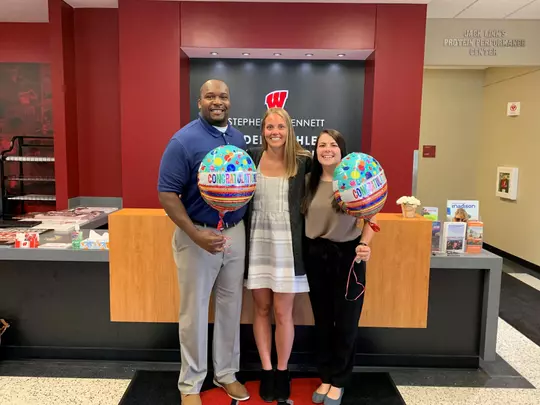
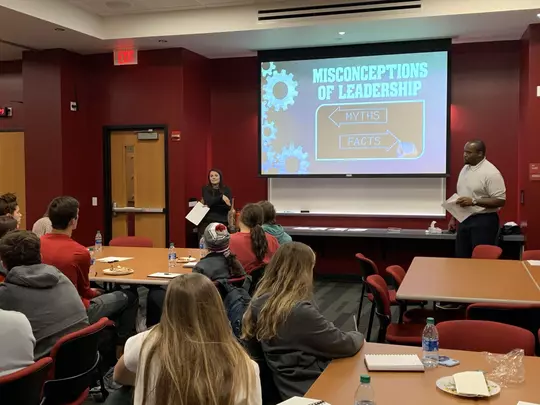
I believe that exposure to different cultures helps build you as a person. I’ve experienced that first-hand at Appalachian State and Alabama. I look forward to growing more during my time here in Madison.
My message to student-athletes everywhere is that if you have something on your mind that you’re really passionate about and you want to get that point across, think about it, form a proposal and then present it. You can’t rush to judgment off emotions. You can’t make decisions off emotions. Think about it and carefully put it together.
Most of all, think about all the countless people that came before you, their sacrifices and their character, and give thanks for their efforts.

Most of all, think about all the countless people that came before you, their sacrifices and their character, and give thanks for their efforts.Joe Suiter













































































































































































































